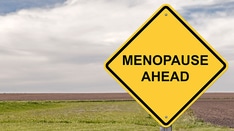Receiving a 15-minute, standardized acupuncture treatment once a week for 5 weeks eased bothersome menopausal symptoms, notably, hot flashes, in a small pragmatic trial.
Researchers randomly assigned 70 women in Denmark who were experiencing "quite a bit" to "a lot" of menopausal hot flashes either to undergo acupuncture from experienced primary care physicians or not to undergo acupuncture.
Those who underwent acupuncture reported a significant decrease in hot flashes, excess sweating, mood swings, sleep disturbances, and skin and hair problems. In addition, it was well tolerated, and those who received acupuncture experienced only very rare, minor side effects, compared with those who didn't receive it.
These findings from the Efficacy of Aupuncture on Menopausal Symptoms (ACOM) study were published online February 19 in BMJ Open.
"The present study demonstrates that acupuncture is significantly superior to no treatment...for menopausal symptoms [and] is a realistic option for women who cannot or do not wish to use [hormone replacement therapy (HRT)]," Kamma Sundgaard Lund, MD, University of Copenhagen, Denmark, and colleagues conclude.
Study strengths included the use of Western-medicine acupuncture, rather than Chinese-medicine acupuncture (which involves yin/yang and the circulation of qi) and the fact that the symptoms were assessed on the basis of the women's replies to a validated MenoScores Questionnaire.
A limitation is that it did not include a sham procedure, although there is no sham procedure could be considered completely inactive.
"Women seeking acupuncture treatment for menopausal symptoms should be informed of the current evidence, and its limitations," the researchers advise, "so they can integrate this with personal preferences and values in their decision making."
Because the intervention was "pragmatic, standardized, and brief," they note, it "could lead to new treatment options for menopausal women."
4 to 5 Years of Symptoms
Most women experience menopause in their early 50s and have menopausal symptoms for 4 to 5 years. Notably, hot flashes affect 75% of women and are "very distressing" for 10% to 20% of women, Lund and colleagues write.
HRT reduces symptoms but carries some risks. Certain antidepressants, gabapentin (multiple brands), or clonidine (multiple brands) may reduce symptoms, but their use is associated with frequent adverse effects. Moreover, evidence for symptom reduction through exercise, use of phytoestrogens in the diet, and herbal remedies is not very convincing.
Acupuncture has shown promise in some research, but the studies had design flaws or were of poor quality.
To investigate its effectiveness, ACOM enrolled healthy women aged 40 to 65 years who were without previous cancer or other exclusion criteria, who had very bothersome menopausal symptoms, and who lived close to any of nine primary care practices in Denmark that offered acupuncture.
The nine participating general practitioners had many hours of acupuncture education and had practiced it for an average of 14 years (range, 4 to 38 years).
The mean age of the participants was 54 years. They had had hot flashes for an average of 3.4 to 4.6 years.
The women in the intervention group received five acupuncture treatments 1 week apart. During these treatments, needles were inserted at eight specific points (CV-3, CV-4, and bilateral LR-8, SP-6, and SP-9) and were left in place for 10 minutes.
The women in the control group were offered this treatment after 6 weeks.
The women replied to the MenoScores Questionnaire at baseline and at 3, 6, 8, 11, and 26 weeks.
The questionnaire has scales for assessing hot flashes, day and night sweats, general sweating, sleep problems, emotional symptoms, memory changes, skin and hair symptoms, physical symptoms, abdominal symptoms, urinary and vaginal symptoms, and sex symptoms, as well as a yes/no item for tiredness.
The acupuncture was well tolerated. Only one woman in the intervention group dropped out of the study because she found the treatment unpleasant.
Four women in the intervention group reported mild side effects of tiredness and headache, stress-related hot flashes, more frequent urination, and leg tingling at an acupuncture needle site. There were no serious adverse events.
Rapid Effects of Acupuncture on Hot Flashes, Some Other Symptoms
Compared to the other women, after 5 weekly acupuncture treatments, the women in the intervention group reported significantly less bother from hot flashes, day and night sweats, general sweating, menopause-specific sleeping problems, emotional symptoms, physical symptoms, and skin and hair problems.
The decrease in hot flashes, emotional symptoms, and skin and hair symptoms was rapid and was apparent after two acupuncture treatments.
Eighty percent of participants in the intervention group said they felt the acupuncture sessions had helped them.
"If we ignore these findings, due to a lack of knowledge about possible specific effects of acupuncture," the researchers write, "women with moderate-to-severe menopausal symptoms could miss out on a low cost and effective treatment with only minor potential adverse effects."
The study was funded by the Idella Foundation, the University of Copenhagen, and the Research Foundation of General Practice, including the Foundation of Multipractice Studies. The authors have disclosed no relevant financial relationships.
BMJ Open. Published online February 19, 2019. Full text
For more diabetes and endocrinology news, follow us on Twitter and on Facebook
Medscape Medical News © 2019
Cite this: Acupuncture a 'Realistic Option' vs HRT for Hot Flashes - Medscape - Mar 04, 2019.












Comments